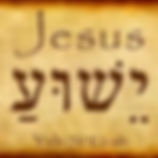The Feast of the Holy Name
- Father Nicholas Lang
- Jan 3, 2023
- 4 min read

What’s in a name? The feast we observe today is centered around one—the Name of Jesus. Many years ago, eight days after Christmas was called the Feast of the Circumcision. Wise decision, methinks, that the church renamed it as it did. Yet the final verses of Luke’s Gospel remind us that, like any Jewish infant boy in his time, Jesus had to undergo this prescribed ritual eight days after his birth and formally be given his name.
What’s in a name? According to Matthew, Jesus is the name told to Joseph when the angel assures him that Mary’s child is conceived by the Holy Spirit. According to Luke, the name was given to Mary by the angel Gabriel before the baby is conceived. Regardless of which account is accurate—and perhaps they both are—this name is significant. The language in which the Gospel was first written was Greek and Jesus is the Latin form of the Greek Iesous and the transliteration of the Hebrew Jeshua or Joshua. It means “God saves.”
It might surprise you that there were a lot of “Jesuses” running around in those days because the name was quite common. Archeologists have unearthed 71 Yesuas from the period of Jesus’ death. For those who speak Arabic it is pronounced Isa, in Chinese he is Yesu, in Italian Gesu and in the Shona language of Zimbabwe the Messiah is called Jeso. Every language in the world has its own variation of the holy name. And what about his last name? No, it was not Christ—which is a translation of the Greek for “the anointed one”—but rather Yeshua Bar Yehosef which is “Jesus, son of Joseph,” the way in which Galileans distinguished themselves, adding “son of” and their father’s name.
So, in the world of his time, this eight-day-old infant bears one of the most ordinary and common names—like John or Mary. There was little about it that suggested exceptionality, holiness, or distinction. But it was the name appointed for him by God and delivered by an angel.
We might question what kind of likeness this garden-variety name Jesus would have for the one who would be called “Wonderful Counselor and Prince of Peace.” Maybe the answer lies in the simple fact that, in God’s realm, the extraordinary is almost always expressed through the ordinary, the spiritual almost always expressed through the material, and grace can most often be discovered in the least likely place we might expect to find it. Grace happens in the very place we live and move and have our being—yes, typically, right under our noses.
What’s in a name? We frequently hear someone say, “I can remember faces, but I can’t remember names.” There’s something odd about that declaration. People are their names. Faces change over time. If you doubt that take a look through the family photo album and then go look in the mirror. Our faces change and we develop bags and sags, but our names do not.
It is in the remembering and recognition of names that we pay attention to others. Long after we are dust, our names will remain. It has been my longstanding practice to address people by name when they come to the Communion Table. And., no it’s really not a innovation, for it has been the practice in the Orthodox Church for ages. I do it because there is much in a name. Our names signify that we are God’s beloved ones, each a unique heir of God’s kingdom. Our name recognizes our individual personhood as members of the Body of Christ.
Now the Church calendar this January 1 may say “Feast of the Holy Name,” but all over the world the majority of people are observing New Year’s Day and many began the celebration last night either with a time of quiet reflection or with great revelry. This day may be a good time for a bit of exploration, first to ponder the name of God in Jesus, learn anew what it means for us and time for an exploration of how we are named—by our families, our career paths, by the culture and society, but most importantly by God.
What names “stick?” What names keep us “stuck?” What names can hurt us? What names hurt others? How does God’s invitation and the blessing of being made in God’s image reorder our sense of identity and our purpose on this planet? Today, then, is an excellent beginning of a new year—an opportunity to begin anew, slates fresh and clean, in the company of the One who created, redeemed, and loved us from the beginning of time. Too, we rejoice in the great name of this faith community—the church of St. Andrew, first-called Apostle— and its place in the history of this city and in the lives of so many people for almost one hundred years.
Still, there is another name by which we as a faith community are addressed in the Scripture: “Living stones.” Peter’s first letter to the church calls us: “Living stones, chosen and precious, let yourselves be built in a spiritual household. You are a chosen people, a royal priesthood, God’s own people, in order that you might proclaim the mighty works of God who called you out of darkness into God’s marvelous light.”
May these profound words guide us in our work through this new year and may God give us the grace to be true to them, faithful to the mission to which they call us, and grateful for all that we have received and all that is to come. Thanks be to God.

